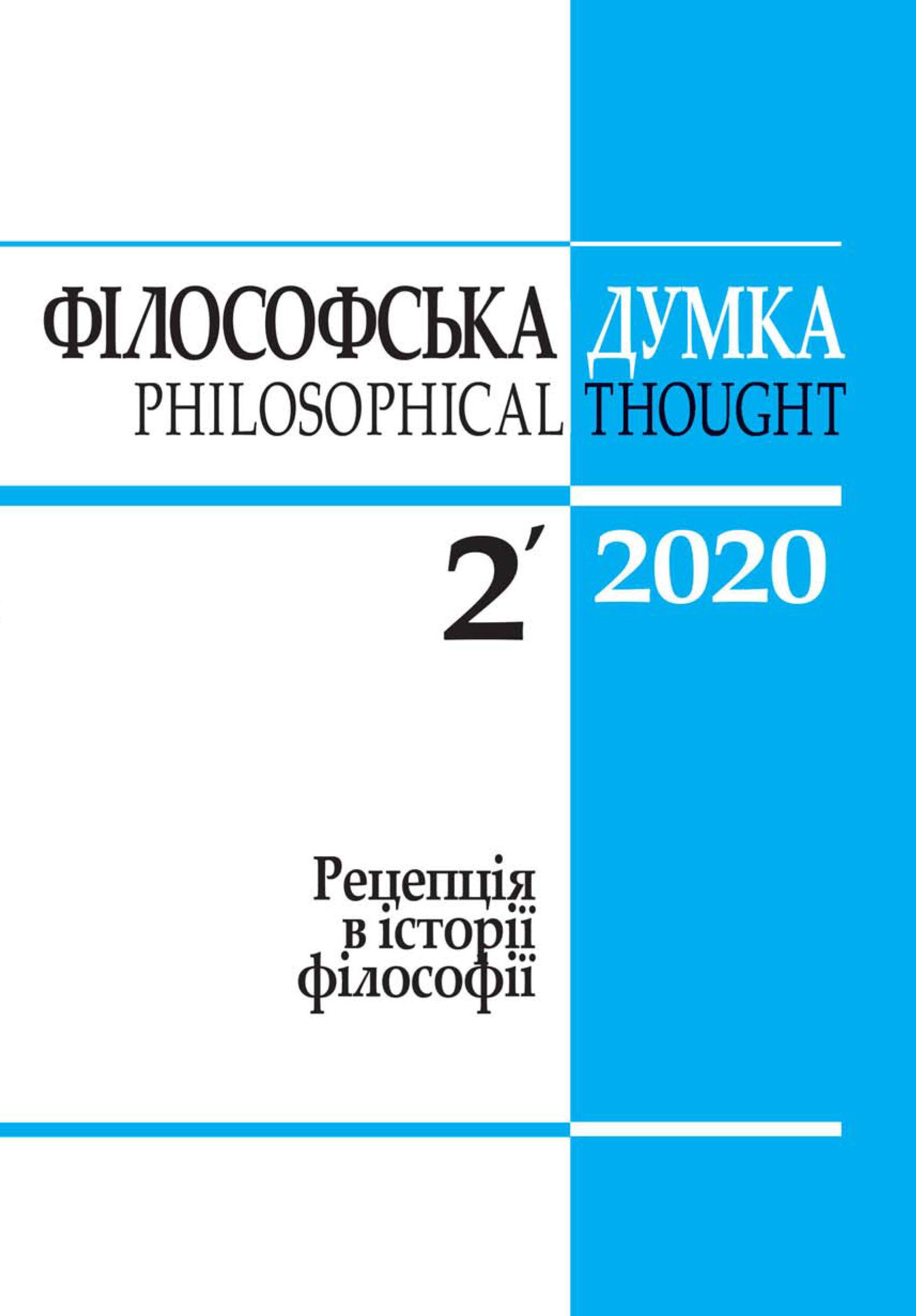Vitalii Turenko. Classical reception studies: from philosophical texts to applied Classics
THE PHENOMENON OF RECEPTION IN THE HISTORY OF PHILOSOPHY
DOI:
https://doi.org/10.15407/fd2020.02.037Keywords:
classical reception studies, ancient philosophy, methods of research, applied ClassicsAbstract
The author analyzes the role and significance of the new scientific area within the Ancient philosophy studies, named Classical Reception Studies. This area manifests itself as a reconceptualization of Antic Studies and therefore is as an interdisciplinary field, which focuses on the study of the receptions of Antiquity. This area is specific in its sphere of interest – not only philosophical heritage of a certain period, but also literary, historical and other sources.
Such aspect of classical reception studies are important as it contributes to thorough and fundamental studies of the history of Ukrainian philosophy because the ancient philosophical heritage was at the center of reflections on Ukrainian philosophy from Kievan Rus' to the present day. Therefore, we see the importance of domestic scientific studies devoted to the study of the receptions of antiquity in general and in the history of Ukrainian philosophy in particular. The latter can help to more understand the specifics of the formation and development of the philosophical tradition in Ukraine.
Classical reception studies can be a specific historical and philosophical method of research of ancient philosophical heritage, along with other methods such as doxography, rational and historical reconstruction, etc. Its peculiarity lies in the fact that it can incorporate elements of doxography, as well as rational reconstruction or other historical and philosophical methods alone or together
The author argues that in the context of classical reception studies, ancient philosophical texts can become a basis for solving contemporary global or local problems and issues of humanity (political, social, cultural, etc.). The potential of ancient texts and fragments (including philosophical ones) is important not only for understanding the past, but also in relation to the developments of society in the present.
References
Baumeister, A., Vestel, Yu., Zvonska, L. (2012). The status and prospects of Ukrainian Classics: a round table discussion of "Philosophical Thought". [In Ukrainian]. Philosophical Thought, 1, 5-25.
Bolgаr, R. (1954). The Classical Heritage and its Beneficiaries: From the Carolingian Age to the End of the Renaissance. Cambridge: Cambridge University Press.
Chaniotis, A., Kuhn, A. Kuhn, C. (Eds.) (2009). Applied Classics: Constructs, Comparisons, Controversies. Stuttgart: Steiner.
Datsenko, V. (2019). The future as a philosophical problem. [In Ukrainian]. Philosophy and political science in the context of modern culture, 11 (1), 15-23. DOI: https://doi.org/10.15421/351903.
https://doi.org/10.15421/351903
Goldhill, S. (2011). Victorian Culture and Classical Antiquity: Art, Opera, Fiction, and the Proclamation of Modernity. Princeton University Press.
https://doi.org/10.23943/princeton/9780691149844.001.0001
Hardwick, L. (2003). Reception Studies. Oxford: Oxford University Press,
Hardwick, L., Stray, C. (2011). A Companion to Classical Receptions. John Wiley & Sons.
Highet, G. (1949). The Classical Tradition: Greek and Roman Influences on Western Literature. Oxford: Oxford University Press.
Holmes, B., Shearin, W. H. (2012). Dynamic Reading: Studies in the Reception of Epicureanism. Oxford: Oxford University Press.
https://doi.org/10.1093/acprof:oso/9780199794959.001.0001
Hunt, J., Smith, R. A,; Stok, F. (2017). Classics from Papyrus to the Internet: An Introduction to Transmission and Reception. University of Texas Press.
https://doi.org/10.5406/illinois/9780252039935.003.0001
Johnson, M. (2019) (Ed.). Antipodean Antiquities: Classical Reception Down Under. Bloomsbury Academic.
Laks, A, Most, G. W. (Eds.) (2016). Early Greek Philosophy. In 9 vols. Harvard University Press.
Macro, A. (1981). Applied Classics: Using Latin and Greek in the Modern World, The Classical Outlook, Vol. 58, No. 3, 73-75.
Martindale, C. (1993). Redeeming the Text: Latin poetry and the hermeneutics of reception. Cambridge: Cambridge University Press.
Pohonchenkova, O. (2017). Classical reception studies - new Classics? Reflections on the "Collection of Greek and Roman Classics in the British Struggle for Social Reform" (Eds. Edith Hall, Henry Stead: Bloomsbury Academic, 2015). [In Ukrainian]. Sententiae, 2, 133-145.
https://doi.org/10.22240/sent36.02.133
Richardson, E. (2018). Classics in Extremis: The Edges of Classical Reception. Bloomsbury Academic.
Downloads
-
PDF (Українська)
Downloads: 550
Published
How to Cite
Issue
Section
License
Authors who publish with this journal agree to the following terms:
- Authors retain copyright and grant the journal right of first publication.
- Authors are able to enter into separate, additional contractual arrangements for the non-exclusive distribution of the journal's published version of the work (e.g., post it to an institutional repository or publish it in a book), with an acknowledgement of its initial publication in this journal.
- Authors are permitted and encouraged to post their work online (e.g., in institutional repositories or on their website) prior to and during the submission process, as it can lead to productive exchanges, as well as earlier and greater citation of published work (See The Effect of Open Access).


